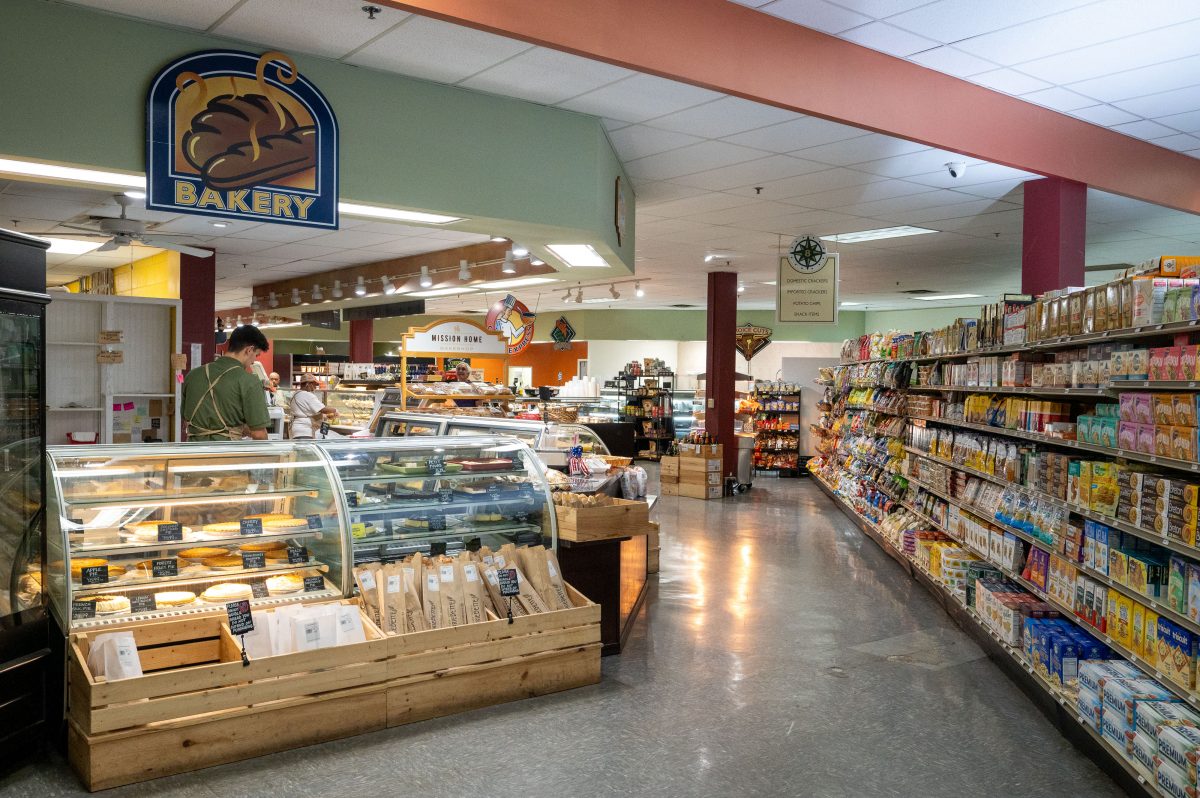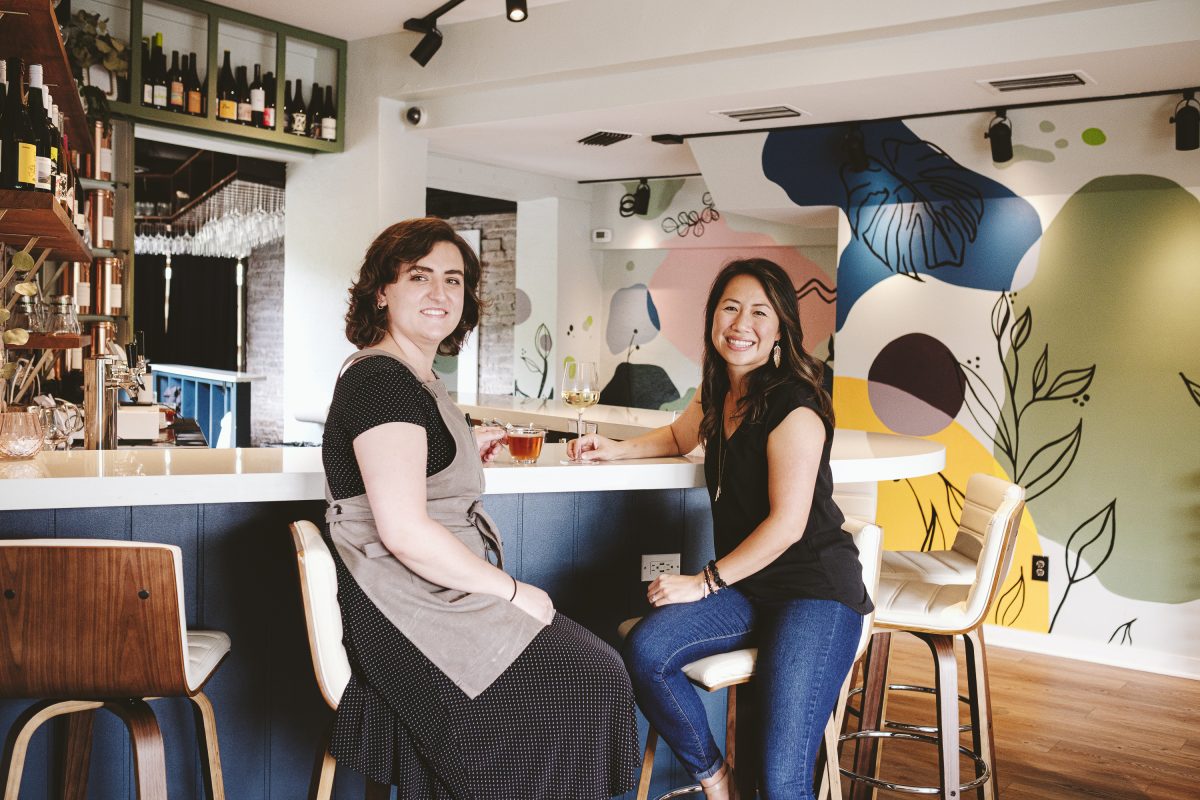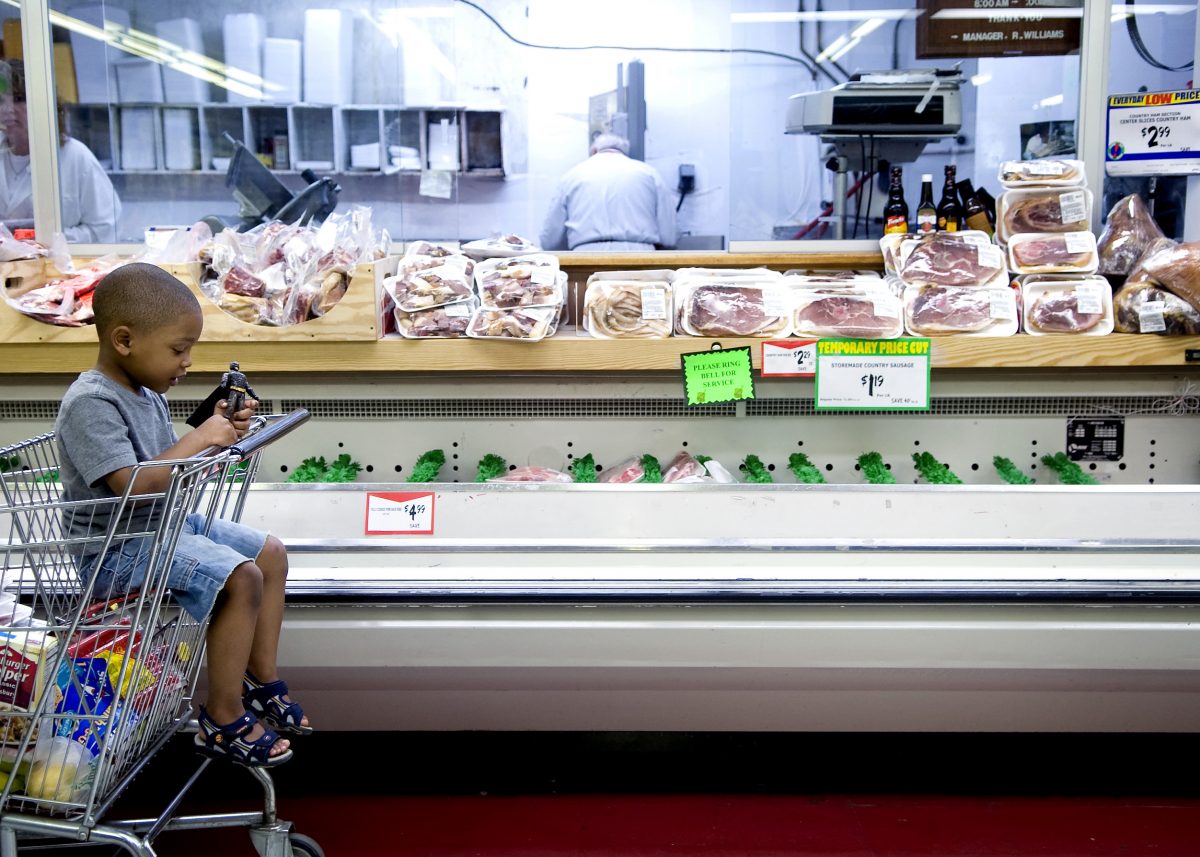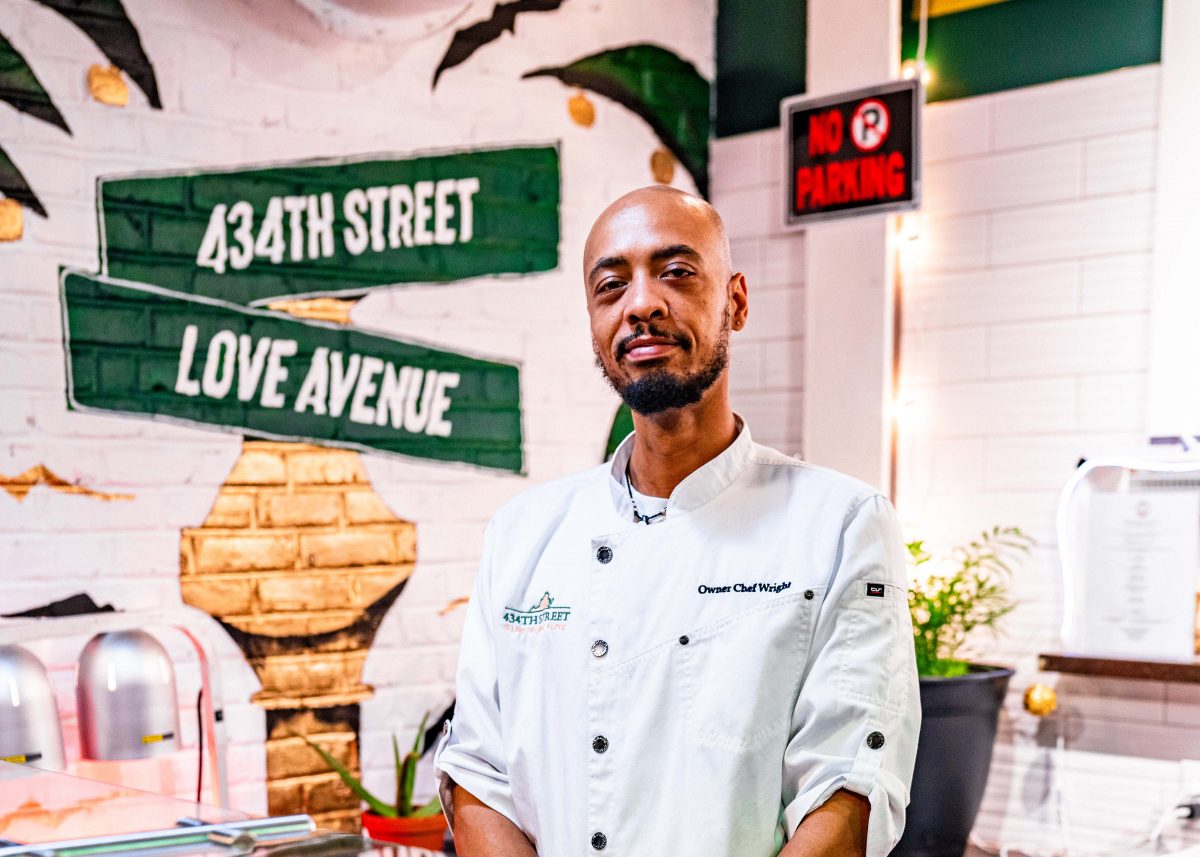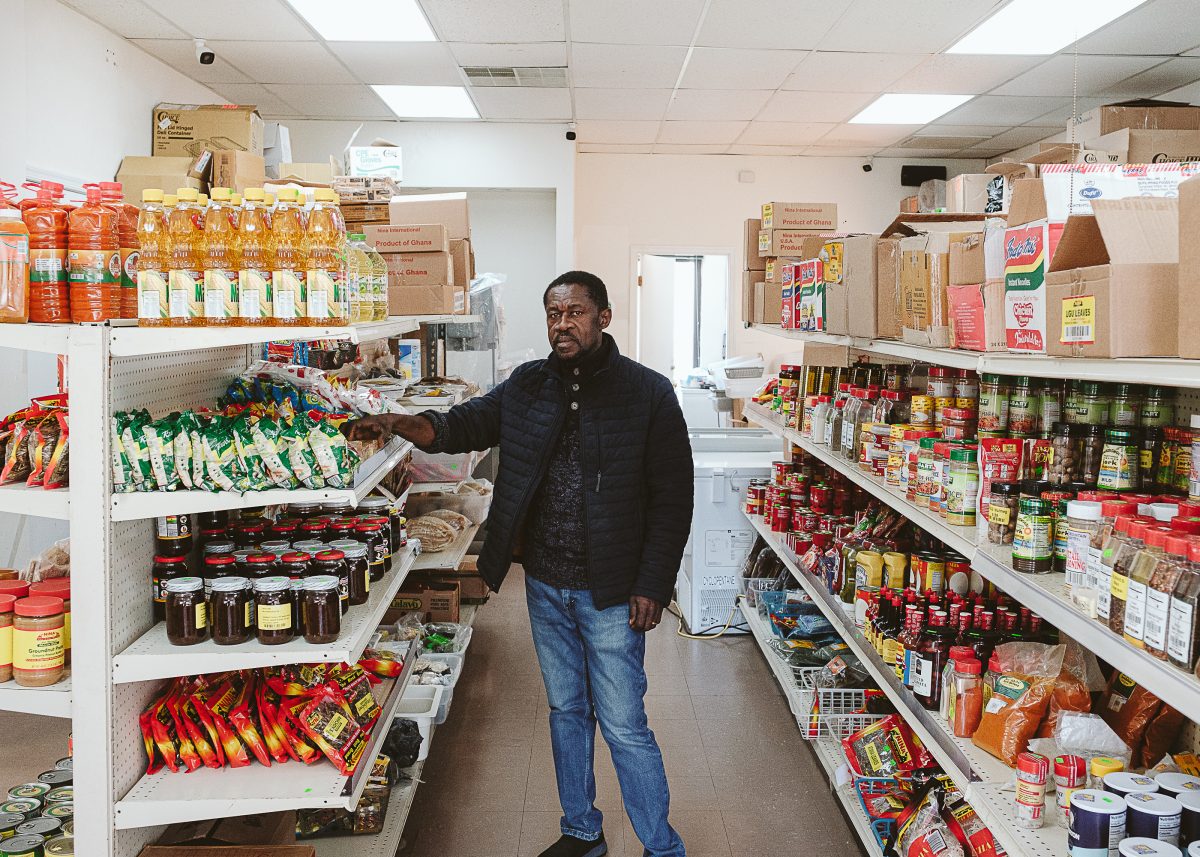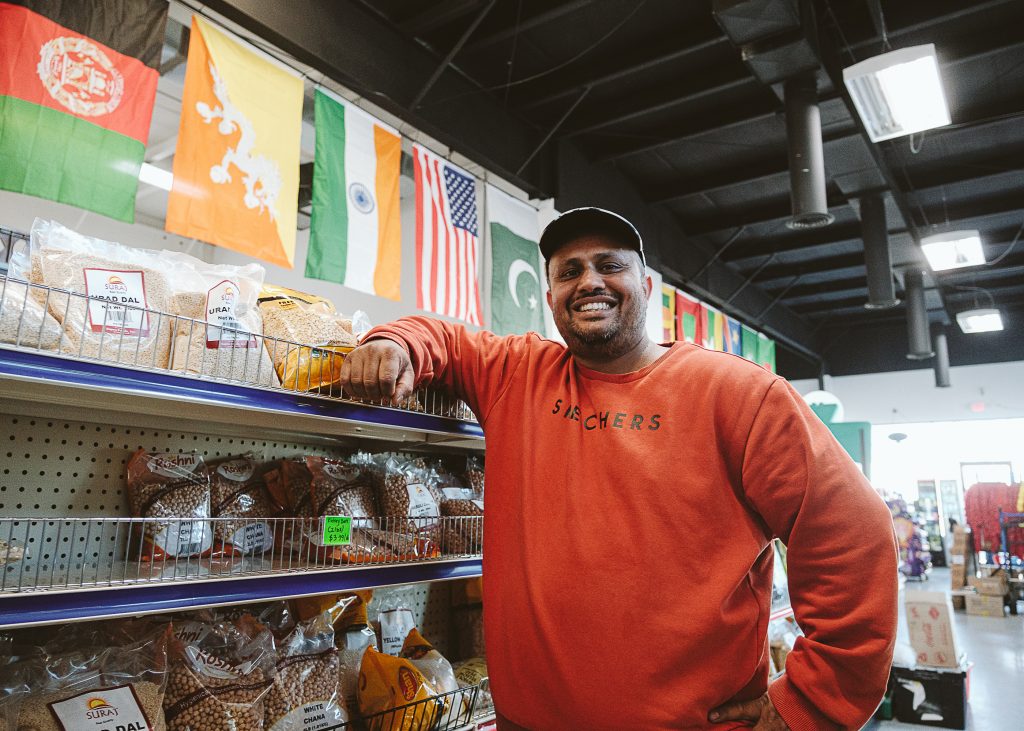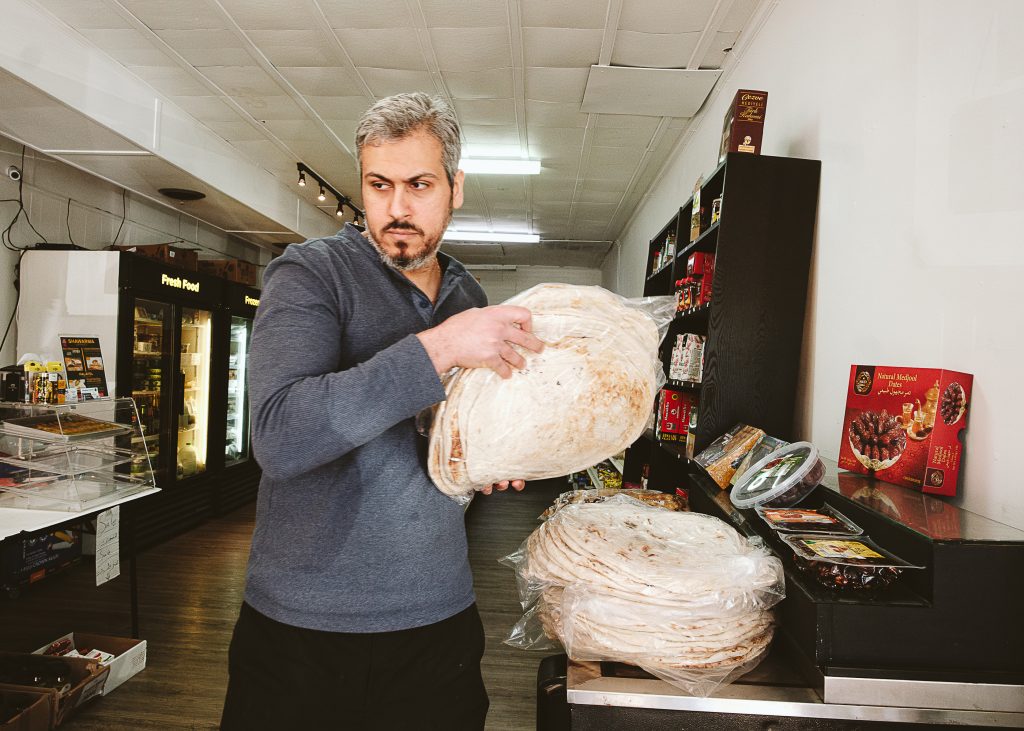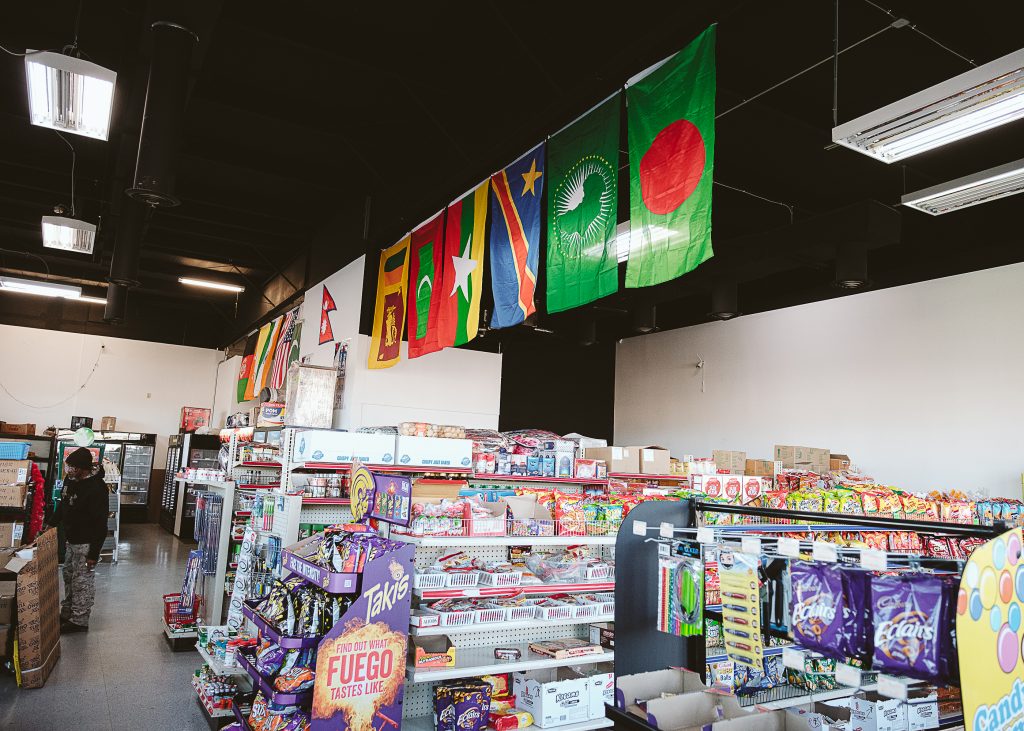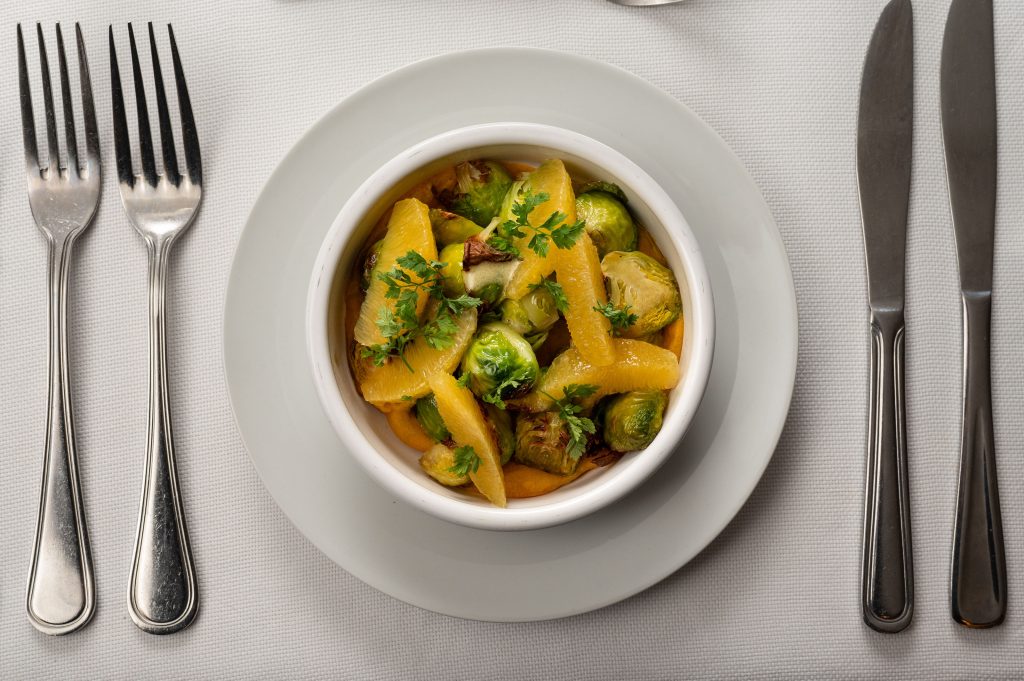Is there a more perfect food to suit all moods? Game’s on? Pizza. Heartbroken? Pizza. Celebrating a win? Pizza (but fancy and paired with prosecco). In this issue, we’re celebrating slices of all kinds—wood-fired, NY-style, and the kind you get at a local event out of the back of a food truck. Hope you’re hungry.
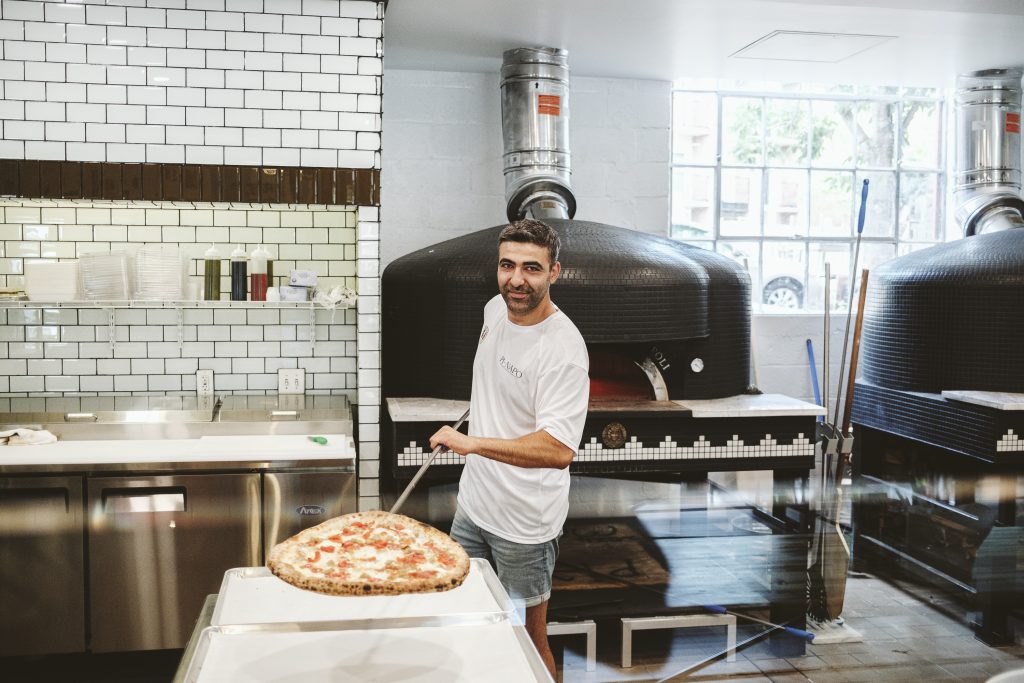
MYSTIC PIZZA
Pi-Napo opens in former Fry’s Spring Station spot with a slice of secrecy
Four brothers opened Pi-Napo, a Neapolitan- style pizzeria on JPA in mid-August. The wood oven-fired pie parlor takes over the Fry’s Spring Station space, which has been vacant since last November.
Hunter Baseg, who received culinary training in Italy, fronts the venture for the four siblings, who originally hail from Turkey. Prior to opening, another Baseg brother spoke on the group’s behalf about the concept and what folks can expect.
“This is going to be a fully Italian, authentic pizzeria,” the brothers say. “We are importing the ingredients, including the flour and tomato sauce … from Italy.”
For pizza aficionados and Italophiles, alarm bells are likely going off. No, Pi-Napo is not a fully DOC-certified pizzeria, which requires techniques to be done in a specific way and all ingredients to follow strict guidelines per the Italian “denominazione di origine controllata,” or DOC. But the restaurant does offer 10 rotating pizza pies inspired by Neapolitan traditions, and imports Caputo double zero flour, mozzarella cheese, and tomato sauce approved by the Associazione Verace Pizza Napoletana.
According to the Basegs, Pi-Napo’s margherita pizza—a wood-fired crust topped simply with tomato sauce and dotted with mozzarella and basil—is a DOC pie; other fresh-from-the-oven offerings are white-based pizzas, pepperoni and sausage pizzas, veggie pizzas, and spicy diavola pizzas.
Pi-Napo has a streamlined menu to go along with its flatbreads, with salads to balance out meals and gelato to finish them off. Rounds pop out of the restaurant’s 1,100-degree oven in about 90 seconds, and the Basegs say diners can expect to wait no more than 10 minutes for their food—even during peak hours on weekends. Italian wine and beer, along with bottles and drafts from local craft breweries, join the usual selection of soft drinks on the beverage menu.
The Pi-Napo dining room, which the Basegs say is unrecognizable from the Fry’s Spring Station layout, seats around 100 people at the pizza bar and large picnic tables. Another 50 to 100 diners can enjoy their food on the restaurant’s large, highly-visible patio.
’Za zealots visiting Pi-Napo place their order at the counter, take a number, sit down, and enjoy a view of the kitchen and imported pizza oven as they wait for their meal. “This is a family-oriented concept,” the Basegs say. “People can sit in front of the open kitchen to see how our pizzaiolos make everything.”
One of the downsides to the former Fry’s site, the Basegs admit, is a lack of parking. That’s something they’re working on with other local businesses, but in the meantime, they hope patrons can find street spots.
One thing you won’t find at Pi-Napo is anything Turkish.
“We’ve always been in the food business, and we are foodies,” the Basegs say. “Being from Turkey, we know Mediterranean food. And Charlottesville already has some really nice Turkish restaurants, so we are not going to go there.”—Shea Gibbs
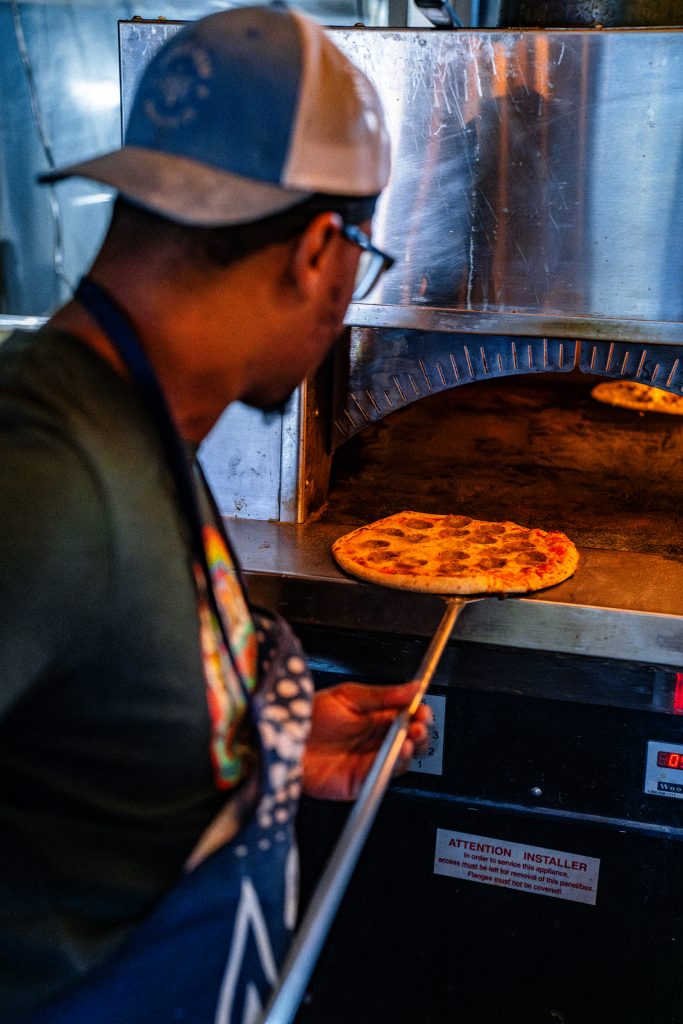
Perfect combo
As if there weren’t enough excellent pizza options in town already, Richmond sent over one of its favorites: Billy Pie, Neapolitan-style pizzas from RVA carb king Billy Fallen, can be found hot and ready out of Random Row Brewing Co.’s stone oven. Choose from classics like margherita and pepperoni, or eat outside the pizza box with Calabrian chili pepper or ricotta and mushroom. Whatever you do, don’t forget a pint of Mosaic to wash it down.—Caite Hamilton
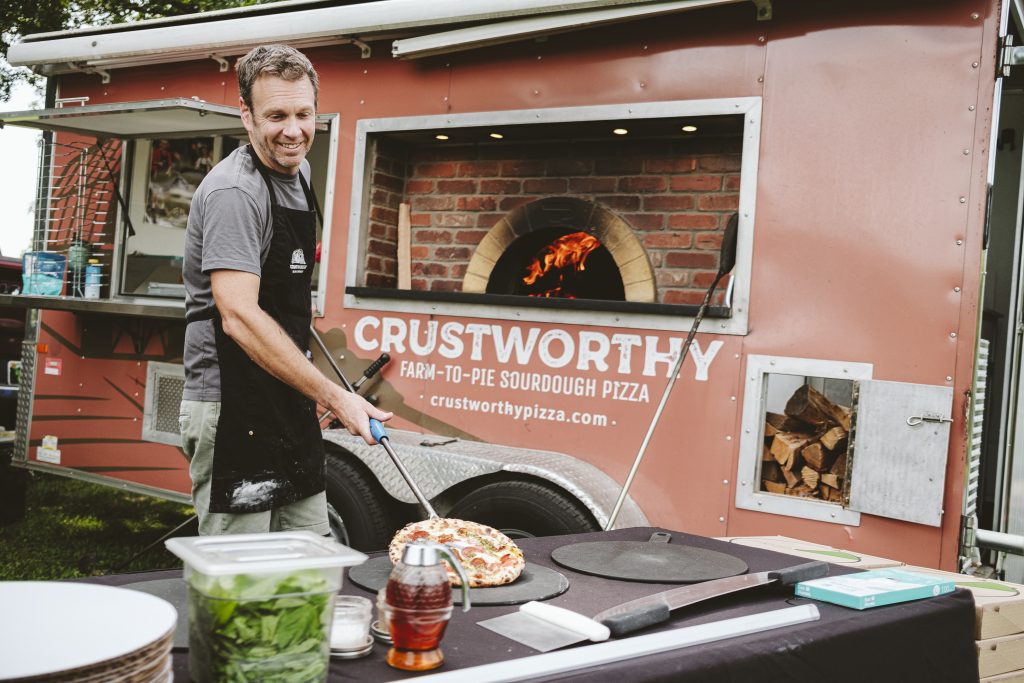
ROLL PIES
Three mobile operators lead the local traveling pizza brigade
There was a time when delivery pizza was king. But as access to in-home meals widened and consumer tastes changed, portable pizza had to roll with the punches. Enter the pizza trailer, high-heat ovens hitched to the back of trucks and toted wherever their owner may want. In Charlottesville, Blue Ridge Pizza Co. is rumbling into its 12th year anchoring the brewery, winery, and reception scene, while relative newcomers Crustworthy and Popitos are also on the streets with fresh-fired eats.
Blue Ridge Pizza Co.
Jay and Melissa Johnson bought the Blue Ridge Pizza Co. trailer from its previous owner in 2020, just before the culinary world flipped upside down. After struggling through their first year, the couple settled into a catering groove serving receptions and parties while maintaining a steady presence on the pop-up scene.
“The thing that drives us is bringing people together over food,” Melissa says. “What better way than with pizza?”
To expand its catering operation, Blue Ridge Pizza Co. began offering linens and tables along with its margheritas and pepperonis. And with pizzas coming out of the Italian-imported brick oven in 90 seconds and eight to 10 pies going in at a time, Jay, Melissa, and their team can serve as many as 200 people in an hour.
At Blue Ridge pop-ups, customers can order individual pies from the menu or customize to their liking. Favorites are the Sicilian Baller (tomato base, shredded mozzarella, shaved Parmesan, Italian style meatballs, roasted red peppers, parsley) and Cider Fest (tomato, shredded mozz and cheddar, smoked pork, seasonal apples, grilled onions, balsamic glaze).
“We make our own dough—there’s not really too big of a secret to it, but we add a little bit of wheat flour to give it more texture,” Jay says. “It’s a two-day process.”
The Johnsons post the Blue Ridge Pizza Co. pop-up schedule to Instagram, Facebook, and their website.
Crustworthy
Tom Kelly began making sourdough before most folks knew a starter from a SCOBY. He started classes at the San Francisco Baking Institute in 2019, punched down on his job in finance, and quickly rose to head baker of his own small business.
In 2022, Kelly decided to take his recipe to the pizza oven, bought a wood-fired oven from upstate New York, and rolled out Crustworthy.
Kelly tries to hew more or less traditionally Neapolitan, with his sourdough crust taking the offerings to what insiders now call neo-Neapolitan. “You don’t need a knife and fork,” Kelly says.
Crustworthy uses some local vendors for its flour, a Pennsylvania cheesemaker for its mozzarella, and local farms for as many veggies as possible. Stock Provisions provides the sausage.
Kelly says his bestseller is the reliable pepperoni pizza, with the classic margherita coming in second. Dig a little deeper on the menu and you’ll find outside-the-delivery-box offerings like the Butternut Blues with a squash base under mozzarella and caramelized onions.
The Crustworthy oven burns at 800 to 900 degrees, baking pies in about two minutes, and on a good night, the trailer pops out more than 150 12-inch rounds. Find out where Kelly and his seven employees will be next on Instagram or Facebook.
Popitos
Popitos graduated to a brick and mortar location in November 2022, but owners Lauren and Ray Zayas haven’t forgotten their mobile kitchen foundation.
The Zayas did their first pop-up in 2020 after a winery client of Ray’s heard about the couple’s backyard pizza parties. By the 2021 season, Ray had dropped his job with Boar’s Head meats and cheeses, and Popitos went full tilt, serving more than 1,500 pies at a music festival and booking more winery events. In 2022, the Zayas started serving at King Family Vineyards and scouting for their physical location, which would soon open at Rio Hill Shopping Center.
Today, Popitos is still on the pop-up scene and offering full catering services. While not a trailer-based operation per se, Popitos totes its oven in a refrigerated truck along with all the ingredients for fresh ’za. At pop-ups, the Zayas and their team serve five flagship pizzas—cheese, pepperoni, the classic margherita, the Meatza with pep, sausage, and bacon, and the Hot Pig with bacon, jalapenos, and hot honey—along with one rotating option.
“Our oven’s name is Bella,” Lauren says. “We have three Bellas—they’re all sisters—so we can pop up in a few different locations.”
Popitos is working on a menu update, so in-store diners can soon expect hot sandwiches along with new appetizers and salads.—SG
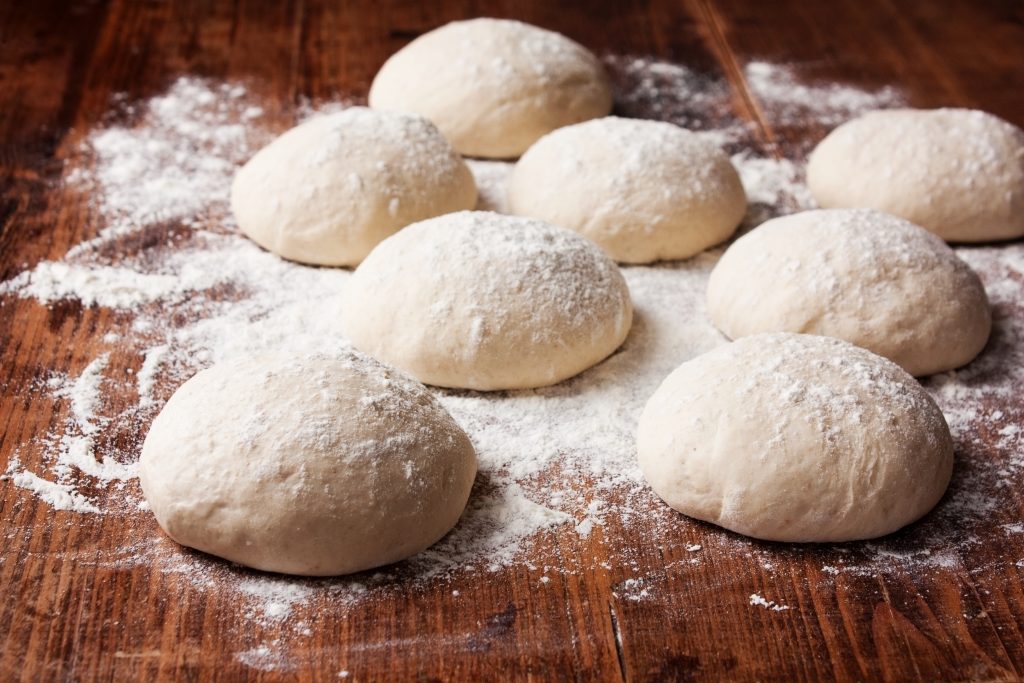
Take and bake
So you wanna make a pizza? You’ll need to start with a strong foundation: the dough. And, while we applaud your ambition, some things are better left to the experts. In Charlottesville, find the cheat code (aka pre-made dough) from trusted bakers at Mona Lisa Pasta, where you can pick up a ball of fresh dough (or a ready-made pie, if you want to throw in the towel entirely) to fire up your home-bake, and Feast!. The local grocery stocks dough from just around the corner at the OG, Albemarle Baking Company.—CH
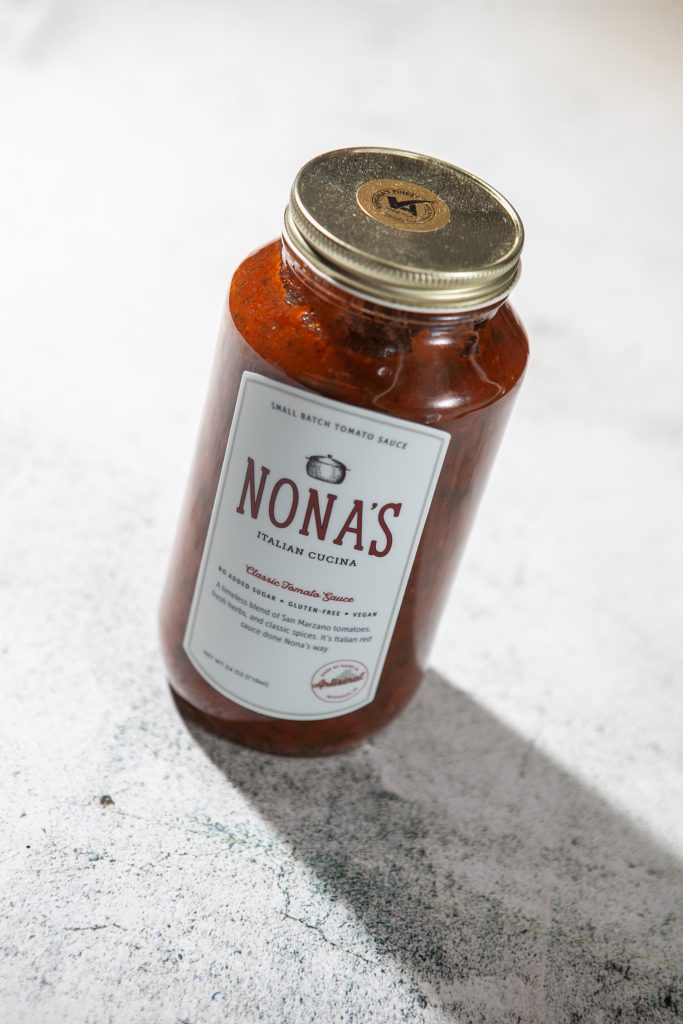
Not-so-secret sauce
One thing that might scuttle your grand at-home pizza experiment? You’ve got the wrong sauce. Let Nona help. Nona’s Italian Cucina tomato sauce—which you can find at a whole host of local retailers, like Market Street Wine, Foods of All Nations, and The Batesville Market—blends San Marzano tomatoes and Italian herbs and spices, filling your own cucina with an aroma that might transport you straight to Milan. Quick! The pizza’s burning!—CH
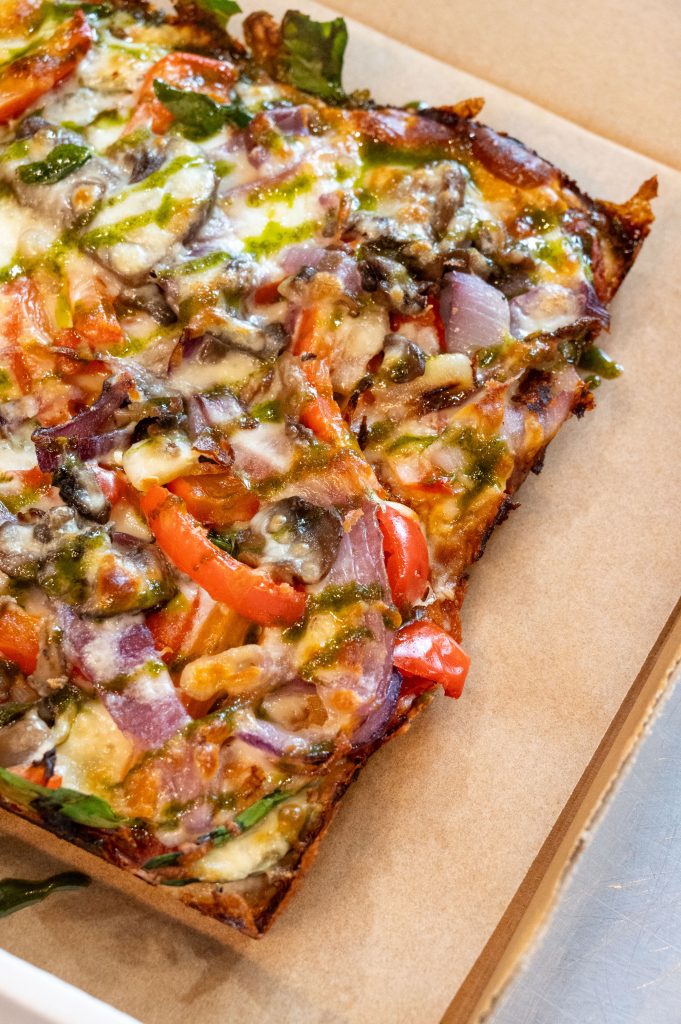
LET THEM EAT BREAD
Baker Ryan Lee is all in for healthy and gluten-free
“I’ve had this gluten-free sourdough obsession since about 2015,” says baker Ryan Lee. Luckily for the rest of us, he’s turned his obsession into his own small business, The Homestead Oven, and keeps the community supplied with delicious varieties of organic GF goodness.
Just taking a deep breath at the store/bakery on Rose Hill Drive delights the senses, lowers your blood pressure, and makes your stomach crave a slice with butter (or olive oil, or cream cheese, or almond butter, or turkey, avocado, and tomato with dill aioli). But then comes the hard part: making a decision. Five seed? Olive and rosemary? Jalapeño cheese? Varieties change by the day and the season.
Lee, a Chicago native, has been self-employed in various aspects of holistic health for two decades and has been eating gluten-free for most of that time. He was studying bee-keeping at a sanctuary in Floyd when he started to learn about sourdough baking. “I thought, ‘This is great,’” Lee recalls, “because most gluten-free sourdough is pretty awful. I started thinking how I could apply [what I was learning].” That led to five years of sourdough experimentation. “Finally, I got a loaf that my family and friends liked, and they all said I should start baking as a business.”
By then Lee and his family had moved to Charlottesville. When the COVID shut-down ended his practice as a hands-on therapist and he was looking for both activity and income, Lee started baking loaves to bring to the open-air City Market—and kept selling out. That led to more sales, word of mouth, and distribution through local specialty groceries. Finally, Lee outgrew his home kitchen and, with a lot of community support, opened The Homestead Oven in a small bakery that he shares with Stacy Miller’s GF venture Good Phyte Foods.
Lee sees offering healthy food “as an extension of the work I was doing, a desire to support and nourish people and to heal them. And [as a massage therapist] I’ve always loved working with my hands. It’s very similar—being present with the dough, you get to know it well. A sourdough starter is a living, breathing culture that has its own rhythms.”
Homestead Oven products are available at the store Tuesdays through Fridays; baking day is Wednesday, but they always have some loaves put away in the freezer (they freeze well and keep for three to four months). The bakery’s main outlet is Ix Market on Saturdays, but loaves are also available at small and organic groceries around Charlottesville. And you can order online for shipping around the country.
The latest good news: “Pizza Night has made its triumphant return,” Lee says with a smile. Once he had his sourdough recipe perfected, he developed a new obsession—quality gluten-free pizza. Again Lee started experimenting, trying to develop a GF pizza dough that would hold up to the toppings and work as both thin- and thick-crust. But offering pizzas was hard to do as the bread business took off, and Lee was still a one-man operation. Now that he has help—“an amazing staff”—Friday pizza nights are back on the website.
The Oven offers three varieties of thick-crust pizza for pick-up; all are fresh, organic, gluten-free, and vegetarian (vegan cheese options are available) and use their homemade fire-roasted tomato sauce. To order, sign up on the Oven’s website for the weekly email with menu options; this is a small-batch operation, so order early—and then enjoy a healthy GF pizza. It might start your own obsession.—Carol Diggs
Home slices
In Charlottesville, you could eat pizza every day of the week for two weeks and still have more slices to try. Consider this a pizzucket list.
Belmont Pizza & Pub
221 Carlton Rd.
Pizzas named after streets in Belmont, plus TVs (and wings) for game days.
Christian’s Pizza
118 W. Main St., Downtown Mall, 100 14th St. NW, 601 Fifth St. SW, 3440 Seminole Trl.
A classic choice for a quick bite, Christian’s offers slices from plain cheese to buffalo chicken.
Crozet Pizza
5794 Three Notched Rd., Crozet
National Geographic once said Crozet’s pies were the “best in the world.” Eat for yourself (any option is foolproof).
Crozet Pizza at Buddhist Biker Bar
20 Elliewood Ave.
Charlottesville outpost for Crozet’s famous pies.
Dino’s
946 Grady Ave. Suite F
Wood-oven artisan pizzas at Dairy Market. Build your own or try one of theirs (recommended: the Hello Sunshine).
Dr. Ho’s Humble Pie
4916 Plank Rd., North Garden
Order a specialty pizza—like the Annie Oakley or the Don Juan—but don’t forget the (housemade) ranch for dipping.
End Zone Pizza
1764 Timberwood Blvd.
Try the All-star at this spot up 29N: two layers of dough, pepperoni, sausage, onions, mushrooms, green peppers and extra cheese.
Extreme Pizza
355 Merchant Walk Sq. Unit 200 (5th Street Station)
With names like The Mammoth, Mr. Pestato Head, and The Screamin’ Tomato, we’re ready to go to extremes.
Fabio’s NY Pizza
1551 E. High St.
A taste of the Big Apple (New York-style = hand-tossed, thin crust, wide slices) in Hooville.
Lampo
205 Monticello Rd.
Authentic Neapolitan slices from a pint-sized Belmont kitchen. Try the Hellboy (and don’t skip the zeppole for dessert).
Marco’s Pizza
930 Olympia Dr.
Thin crust pizza sliced Greek-style (crossways into rectangles) for easy grabbing.
Matchbox
2055 Bond St. (The Shops at Stonefield)
If you eschew the glu(ten), Matchbox has you covered with its gluten-sensitive cauliflower crusts on its 10-inch or 14-inch pies.
Mellow Mushroom
1321 W. Main St.
Here it’s the Kosmic Karma: the pizza chain’s take on a margherita, with unexpected additions like sheep’s milk feta and a swirl of pesto.
Pi-Napo
2115 Jefferson Park Ave.
Four brothers creating 10 rotating wood oven-fired pizza pies inspired by Neapolitan traditions. Mama mia!
Sal’s Pizza Crozet
5752 Three Notch’d Rd., Crozet
A cult favorite for its NY-style pies.
Vita Nova
321 E. Main St., Downtown Mall
Grab a gourmet Italian slice to go and feel renewed (DYK Vita Nova means “new life”?).
Vocelli Pizza
1857 Seminole Trail #29
Here you’ll find a pie that combines two of life’s greatest comforts: pizza and mac ‘n’ cheese (among more traditional options).

